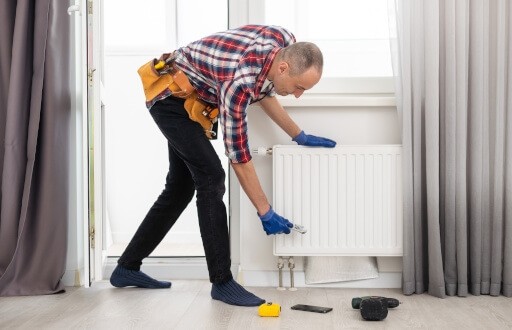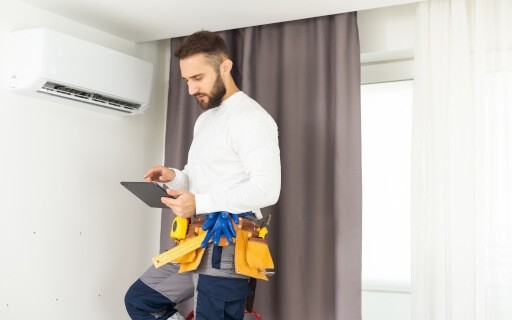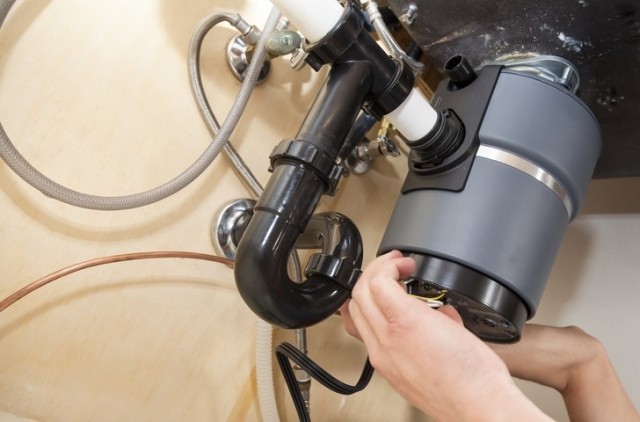Every rental property eventually needs a bit of maintenance. Whether you’re a landlord who prefers to DIY or to outsource your maintenance work, it’s necessary to have a toolbox for basic maintenance and repairs. Maintenance issues can pop up at any time, and some tenants will feel more comfortable than others making fixes themselves. It’s best to have a few basic tools on hand in order to mend small issues in a timely and cost-efficient manner.
Tools for Basic Maintenance Tasks
A landlord’s basic toolbox needs supplies that can complete simple repairs. Even if you’re not hands-on with maintenance, it’s best to be prepared for issues that don’t require you to call in a professional. Every landlord should invest in a few high-quality tools in a variety of sizes that can be used for small tasks and easy fixes. Your toolbox should include the following:
- Hammer
- Nails and screws
- Saw
- Tape measure
- Screwdriver (flat and phillips head)
- Wrench (crescent and socket)
- Pliers
- Utility knife
- Flashlight
- Power drill
- Duct tape
- Caulk (silicone, latex, and a specialty caulk for outdoor use)
- Basic pest control supplies (i.e., traps, bait, and spray)
This list is very simple. If you’re more hands-on with your maintenance, you will want to add more items.
Small electrical repairs
If you plan to DIY small electrical repairs, add a few items to your toolbox to get started:
- Multimeter
- Wire splicing tool
- Voltage Tester
- Pliers
Electrical issues can be a bit tricky, so remember to be cautious when working with electricity. Don’t forget to turn off the specific circuit through the breaker box while you’re working. If you’re ever unsure of something, it’s best to call a professional in for help.
Basic plumbing repairs
Prepare for any basic plumbing maintenance with these tools:
- Bell-shaped toilet plunger
- Multi-driver
- Locking pliers
- An assortment of screws and other fasteners
- Wall anchors
- Electrical tape, duct tape, plumbing tape
- Carpenter’s glue
- Two-part epoxy
If you’re questioning a plumbing repair, leave it to the professionals. You don’t want to make an issue worse or injure yourself for something a professional can handle instead.
Your tenant(s) should be aware of what type of plumbing system they’re on and how to take care of it. Septic systems are different from other plumbing systems, so it's essential to outline this in the lease to prevent issues.
Supplies for painting and cosmetic maintenance
As a landlord, you can cut extra costs by taking care of cosmetic maintenance yourself. Cosmetic maintenance includes painting, lawn care, pressure washing, etc. Even if you don’t do the painting yourself, it’s best to have a few cans of paint brushes for quick fixes. The following items are great additions to your toolbox:
- Touch-up paint
- Brushes
- Rollers
- Drop cloths
- Paint tray
- Drywall joint compound
- Drywall tape
- Spackling compound
- Patching compound
- A four-inch putty knife
- A paint scraper
- Pressure washer
- Lawn mower
- Shovel
Supplies for Cleaning
It’s up to your renter(s) to keep the inside of the unit clean while they’re residing in it, but you should have a few cleaning supplies on hand to clean up after a repair. Cleaning supplies also come in handy between tenants while you’re turning over your rental property. These supplies should include:
- Mop
- Assortment of rags and sponges
- Bucket
- Vacuum cleaner
- Spray bottle
- Squeegee
- Vinegar
- Ammonia
- Bleach
- Dish soap
- Enzyme-based drain cleaner for slow drains(check your septic system for the best drain cleaner)
- Scouting powder
- Window cleaner
Tips and Tools for Tenant Lockouts
Tenants sometimes switch locks or add padlocks and forget to take them off after they move out, so it's a good idea to add a pair of bolt cutters to your toolbox.
It’s also good practice to have at least one spare set of keys for each rental. Keep the keys in a secure place only you can access. For security reasons, never hand the spare key to anyone other than your tenant or property manager.
If your tenant needs the spare key for a lockout, it's best to go to the unit yourself and unlock the door for them. It’s also a good idea to check that the tenant's ID matches the name on the lease before you unlock a unit, even if you’ve met them before. It’s better to be safe than sorry in these situations.
Consolidate Your Tools in One Place
Consolidate your maintenance supplies in one toolbox in order to stay organized. If you’re a landlord who likes to be hands-on with maintenance, you may find that a toolbox isn't big enough for your supplies. In this case, invest in something like a utility cart. A utility cart gives you more room to store all your tools if you outgrow a basic toolbox.
It’s equally important to consolidate maintenance requests and records of past requests in one place. This helps ensure that you are taking care of the requests in a timely manner and have a record of what was completed and when. If your rental is listed on Apartments.com, our full suite of rental tools are here to help. With our online maintenance platform, tenants can submit maintenance requests online. We notify you when you have a request, and you can easily update your tenants as the repair progresses. You can even attach receipts, upload notes, and track expenses for the repairs. You and your tenants can even share images and videos. Keeping everything in one place makes it easy to keep track of repairs, how often something is requiring repair, and how future repairs might impact your budget.











